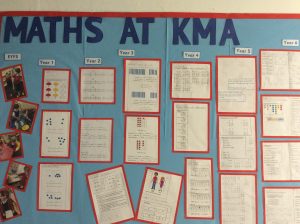Subject leader: Miss R Peace
Mathematics is important in everyday life. It is an essential skill that all children will use daily throughout their lifetime.
Our aims
· To foster an enjoyment, fascination and confidence in maths for all children.
· To know by heart number facts such as number bonds, multiplication tables and related division facts and doubles and halves.
· To ensure all children can make links between mathematical ideas; relate mathematical concepts to the real world and apply these when reasoning and solving problems.
· To have a bank of mental and written methods/skills that they can draw upon and use when necessary.
· To ensure all children are able to achieve and are challenged appropriately.
· To develop children’s understanding and use of mathematical vocabulary.
In order to achieve our aims, we are developing a mastery approach. This means we teach all the children in a class together with a focus on making connections and understanding the structure of mathematics.
In years 1-6 staff teach to the Primary Maths National Curriculum, following the NCETM Prioritisation documentation to support planning. All children have 1 maths session per day. In addition to this, in years 1-6 children take part in a daily arithmetic session.
EYFS use the Mastering Number programme 4x per week. Children then apply their learning in the different areas in provision.
Formative assessment takes place throughout each session so children can be challenged effectively, this assessment also impacts on the following days planning to ensure children’s needs are met.
Concrete
Children use practical equipment e.g. Numicon, counting bears and counters to gain a solid understanding of mathematical concepts, making links with new learning and developing analytical thinking for problem solving. Across school every new concept in mathematics is taught practically and in real contexts first, to support understanding and deepen learning.
Pictorial
When children are ready they replace concrete apparatus with a pictorial representation – essentially a drawing or picture which still provides them with a support to access their learning. This is sometimes used directly alongside the concrete resources to aid understanding.
Abstract
Once children really understand the concept, they can then move into the abstract – using numbers and symbols and formal written methods, as well as developing their mental recall.
At the point in which children are secure with their fluency in areas of the mathematics curriculum – their thinking is challenged and extended through open ended, high order questioning and problem solving activities, as well as variation in how problems and questions are presented.
How is the content / theme chosen?
The content is chosen to ensure coverage of the knowledge, skills and expectations, as set out in the National Curriculum programmes of study, as well as the EYFS framework. Content may be linked to teaching and learning in other subject areas, such as Science. The content may be adapted or changed, based upon the needs of specific cohorts.
How do we ensure progression of knowledge and skills?
At King’s Meadow Academy we have in place, for each subject area, a knowledge and skills progression document, which is used for planning, to ensure sequenced and appropriate content for specific year groups, as well as a build up of knowledge and skills.
Alongside this, we use the recently produced Department for Education materials, (Teaching Mathematics in Primary Schools Guidance, July 2020) to ensure that key learning and understanding has taken place by the end of a specific year group, ensuring children are then ready to extend and deepen their knowledge in subsequent years.
Aside from these documents, teachers will plan activities and opportunities for consolidation, stretch and challenge, in order to meet the needs of all learners.
How do we know that our children are making progress?
Ongoing assessments of the children’s knowledge and skills are observed daily by the class teacher. Misconceptions are addressed and next steps carefully planned. Children’s outcomes are compared to the subject specific skills and knowledge documents, as well as the year group expectations from the National Curriculum or EYFS Framework. Senior leaders and subject leaders gather an overview of children’s learning and outcomes through monitoring activities. In Key Stage 2, children undergo Maths Arithmetic and Maths Reasoning tests each term which are used to plan their future next steps as well as provide an overview of learning within a subject area across the whole school.
King’s Meadow Academy Maths Policy 21-22

